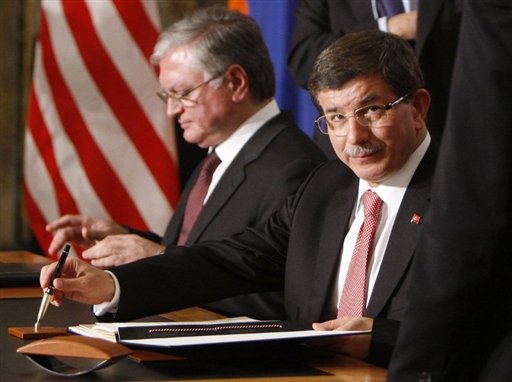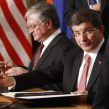
Turkish-Armenia Protocols Create Concern over Karabakh
Publication: Eurasia Daily Monitor Volume: 6 Issue: 188
By:

Turkey and Armenia signed twin protocols on October 10 that were in preparation since February of this year (EDM, February 10, March 27, April 9, May 14, May 18, October 7). Under the agreement, Turkey and Armenia will establish diplomatic relations and re-open their border. It also calls for a panel to investigate the contentious issue of the alleged “genocide” in 1915. The process of preparing these protocols was long and drawn out. However, Turkish and Armenian diplomats skillfully negotiated the agreement. A temporary crisis erupted at the last minute, which delayed the signing ceremony for three hours. Apparently Armenian diplomats objected to the text of Turkish Foreign Minister Ahmet Davutoglu’s speech in which he stressed that the South Caucasus should become a region of peace and tranquility and that the Karabakh dispute between Azerbaijan and Armenia should be resolved. Yerevan has sought from the very outset of the normalization process to treat the Karabakh issue separately. In return, the Turkish side objected to the text of Armenian Foreign Minister Edward Nalbandian’s speech in which he referred to historical events: implying the Armenian “genocide” (Hurriyet, October 11).
American and Russian officials intervened and supported the Turkish proposal to sign the protocols without delivering speeches. While the Armenians were reluctant to sign the protocol, the Russian Foreign Minister Sergey Lavrov wrote a note to his Armenian counterpart: “Edward! Accept the ceremony without statements!” Javier Solana (E.U. High Representative for Common Foreign and Security Policy) and the French Foreign Minister Bernard Kouchner signed the note and sent it to Nalbandian –which convinced the Armenians to sign the protocols (www.pravda.ru, October 12).
Armenians have long argued that the Karabakh dispute should be a separate issue and that Ankara should not use it as a precondition for Turkish-Armenian rapprochement. Yet the Turkish side, due to the country’s close relationship with Azerbaijan, always links Karabakh to the Turkish-Armenian normalization process. One week before the signing ceremony, Armenian diplomats rejected the Turkish offer to invite the U.S. Russian and French Foreign Ministers as members of the Minsk Group (which was established to find a solution to the Karabakh issue) (Aksam, October 5).
During the ceremony the members of the Minsk Group were behind Davutoglu and Nalbandian, which provided an impression that powerful states supported the Turkish-Armenian rapprochement. Inviting the members of the Minsk Group to the signing ceremony was one of the Turkish diplomatic successes. Yet, in order to link the Karabakh issue with the protocols Turkish neo-nationalists objected to the picture of the Turkish and Armenian foreign ministers signing the protocols in the presence of U.S., E.U., and Russian officials, as if they were under international pressure (Haberturk, October 13).
Nevertheless, there is no direct reference to Karabakh in the protocols. Indeed, the protocols contain only indirect references to it:
“Referring to their obligations under the Charter of the United Nations, the Helsinki Final Act, the Charter of Paris for a New Europe, reconfirming their commitment, in their bilateral and international relations, to respect and ensure respect for the principles of equality, sovereignty, non-intervention in internal affairs of other states, territorial integrity and inviolability of frontiers, bearing in mind the importance of the creation and maintenance of an atmosphere of trust and confidence between the two countries that will contribute to the strengthening of peace, security and stability of the whole region, as well as being determined to refrain from the threat or the use of force, to promote the peaceful settlement of disputes, and to protect human rights and fundamental freedoms” (Turkish-Armenian Protocol on establishing good neighborly relations and to develop bilateral cooperation in the political, economic, cultural and other fields, October 10).
In response to nationalist criticism, the Turkish government has pointed to the above mentioned indirect reference to the Karabakh dispute, and emphasized this in the ratification process. Although it was revealed that the government will send the protocols to the Turkish parliament on October 21, Prime Minister Recep Tayyip Erdogan declared that parliament will await the resolution of the Karabakh dispute and only then ratify the agreement (NTV, October 12). However, it appears that such a strategy is unsatisfactory for Baku, who sent a group of parliamentarians to Ankara to ensure that the Turkish parliament does not ratify the protocols until the dispute between Azerbaijan and Armenia has been resolved (Vatan, October 13).
What makes Turkish nationalists and the Azerbaijani government anxious is whether the international community will pressure Ankara to ratify the protocols before finding a solution to the Karabakh issue. Promises made by the international community before the referendum in Cyprus to unify the island in 2004 and its subsequent failure to keep these promises, has raised fears among the Turkish public concerning Karabakh. In the case of Cyprus, without keeping its promises to end the isolation of the Turkic Cypriots, the E.U. is exerting pressure on Turkey to recognize the Greek Cypriot state as representing the whole island.
Delaying the ratification process in the Turkish parliament until Azerbaijan and Armenia resolve the Karabakh dispute would be an intelligent policy for Ankara to pursue to avoid any international pressure to open its border with Armenia ending its long standing boycott caused by the Armenian occupation of Azerbaijan’s province of Karabakh. However, since there is no direct reference to Karabakh in the protocols, it might prove counterproductive if international actors, such as Russia, the E.U., or the U.S. change their current positions to put pressure on Ankara to ratify the protocols before a solution to the Karabakh issue is agreed.




